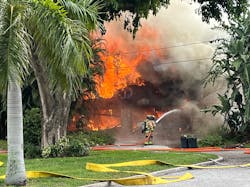First Due: Vacation Rentals and Fire Jurisdictions
We aren’t politicians, but public servants, and among the most valuable services that we provide is safety. Walk into any supermarket, doctor’s office, library, etc., and you will find occupancy-specific passive and active fire and life-safety features that are designed to protect life and to limit the damage that’s caused by fire: fire barriers, fire alarm systems and sprinklers systems, to name a few. Fire departments have done a commendable job of keeping up with the change in these areas. However, one area where change has outpaced our ability to keep up is vacation rentals.
Let me be clear: I am not proposing the enactment of any new legislation or ordinance that’s aimed at restricting or prohibiting residential occupancies from renting as vacation rentals. That isn’t my goal nor my role. The value that both small and large businesses provide to a healthy, vibrant community must be recognized. However, as fire marshal at West Manatee Fire Rescue (WMFR) in Bradenton, FL, I am the primary advocate for the safety of the public and first responders. First and foremost, my objective always is life safety.
Safety in vacation rentals
In a recent episode of The NFPA Podcast, Justin Ford, who is the director of vacation rental safety & certification at Breezeway, said that someone is injured in a short-term rental every 44 seconds. Estimations aside, during the past three years on Anna Maria Island off of the coast of Florida, there were 11 structure fires at single-family residential occupancies. Of those 11, eight, or 73 percent, occurred at licensed vacation rentals.
Furthermore, in 2022, there were three pediatric drownings or near-drownings on the island at vacation rentals.
To improve the safety of vacation rentals, fire departments must be proactive. It’s imperative to connect with vacation rental owners and property management companies to deliver a clear and concise life-safety message. Some of the ways that I have succeeded in connecting with property owners/managers include:
- Hosting stakeholder gatherings
- Visiting property management companies
- Writing articles for a local newspaper
- Speaking at local real estate associations
- Speaking at local government commission meetings
Providing minimum standards
Once the line of communication with vacation rental owners/managers is established, it’s necessary to educate them on the minimum standards that are expected for their vacation rental. In Florida, these standards are outlined in Florida Administrative Code 69A-43. They include, but aren’t limited to:
- Currently certified 2A-10BC extinguisher in an approved location
- Dryer ducts must vent to the outside and be free from lint
- Extension cords may not be used as permanent wiring
- GFCI outlets in wet locations
- Working smoke alarms must be installed in each bedroom, in hallways that are outside of bedrooms and in the common area of the house
- Carbon monoxide alarms must be installed in dwellings that have gas appliances and/or attached garages
- A vacation rental license that includes contact numbers and procedures for reporting an emergency
Because many local fire codes don’t address swimming pool safety, departments should work closely with their local Safe Kids Coalition to provide Designated Water Watcher literature to vacation rental owners/managers.
Changing together
As the number of vacation rentals continues to grow across the country, so do the inherent risks that are associated with them. The industry’s rapid growth and transient nature necessitate a well-executed plan that includes departments communicating a clear and concise life-safety message to vacation property owners/managers. To date, there are more than 3,000 licensed vacation rentals in West Manatee Fire Rescue District. Do you know how many are in your jurisdiction, and most importantly, are they safe for the public and first responders?
About the Author

Rodney Kwiatkowski
Rodney Kwiatkowski has been fire marshal at West Manatee Fire and Rescue District in Florida since 2019. As fire marshal, he is the primary advocate for public and first responder safety.
